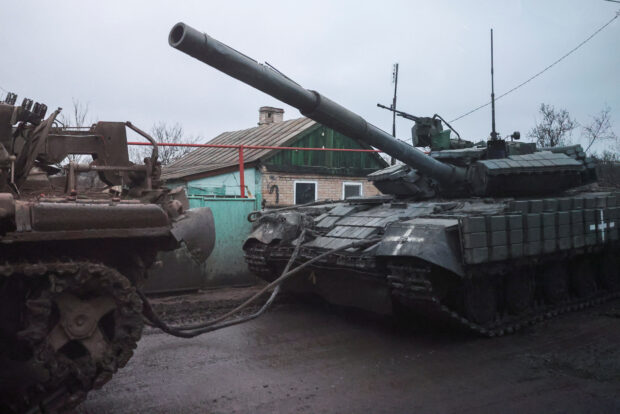
A tank is towed through a road, amid Russia’s invasion of Ukraine, near the bombed-out eastern Ukrainian city of Bakhmut, in the eastern Donetsk region, Ukraine, March 29, 2023. (REUTERS)
Russian forces have had some success in the frontline city of Bakhmut, Ukrainian military officials said on Wednesday evening, and the U.N. nuclear watchdog chief is putting aside plans for a security zone around a major power plant in Ukraine.
The mining city of Bakhmut and surrounding towns in the eastern industrial region of Donetsk have been the focal point of assault for much of the 13-month-long invasion by Russia of neighboring Ukraine. Neither side yet has full control with heavy losses suffered by both.
“Enemy forces had a degree of success in their actions aimed at storming the city of Bakhmut,” the General Staff of the Ukrainian Armed Forces said in its regular nighttime report. “Our defenders are holding the city and are repelling numerous enemy attacks.”
The average number of daily Russian attacks on the front line reported by Ukraine’s general staff has declined for four straight weeks since the start of March, to 69 in the past seven days from 124 in the week of March 1-7. Just 57 attacks were reported on Wednesday.
Reuters journalists near the front lines west of Bakhmut and further north also reported a notable decline in the intensity of Russian attacks last week. Russian officials say their forces are still capturing ground in street-by-street fighting inside Bakhmut.
Britain’s defense ministry this week described the progress of Russian forces as “marginal” and on Wednesday, the U.S. top general Mark Milley told lawmakers: “For about the last 20 to 21 days, the Russians have not made any progress whatsoever in and around Bakhmut.”
Reuters was not able to verify battlefield reports.
BESIEGED NUCLEAR PLANT
The Zaporizhzhia nuclear power plant in southern Ukraine was captured by Russian troops in the opening weeks of the war a year ago and attempts to reduce fighting and shelling around it have failed.
Rafael Grossi, head of the International Atomic Energy Agency, on a repeat visit to Zaporizhzhia on Wednesday, said he was putting aside plans for a security zone so he could propose specific protection measures acceptable to both Moscow and Kyiv.
“It is obvious that military activity is increasing in this whole region. So the plant can’t be protected,” Grossi told Russian reporters. A recording of the briefing was made available to Reuters.
On Tuesday Grossi told Reuters he was pressing on with efforts to find a security solution for what is Europe’s largest nuclear power plant.
“I am not giving up in any way. I think on the contrary we need to multiply our efforts, we need to continue,” he said.
The plant was a prized part of Ukraine’s energy network and accounted for around 20% of national power generation before the invasion. It has not produced any electricity since September, when the last of its six reactors was taken offline.
UKRAINE STRIKES BEHIND FRONTLINE
The Ukrainian military struck a railway depot and knocked out power in the Russian-occupied southern city of Melitopol deep behind front lines on Wednesday.
Unverified images on the internet showed explosions lighting up the night sky with streaks of contrails in Melitopol, base of the Russian-controlled administration in Zaporizhzhia, one of five Ukrainian provinces Russia claims to have annexed.
What Moscow has called a “special military operation” to reduce a threat to its own security has killed thousands of troops on both sides, tens of thousands of Ukrainian civilians and displaced millions. The invasion also shook the global economy and disrupted international relations.
The UK, the United States and European allies of Ukraine have provided the Kyiv government with weapons and money, describing the invasion as an imperial-style land grab by Russia.